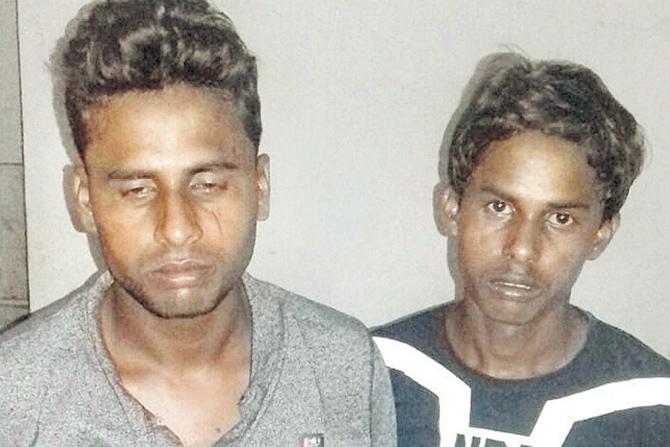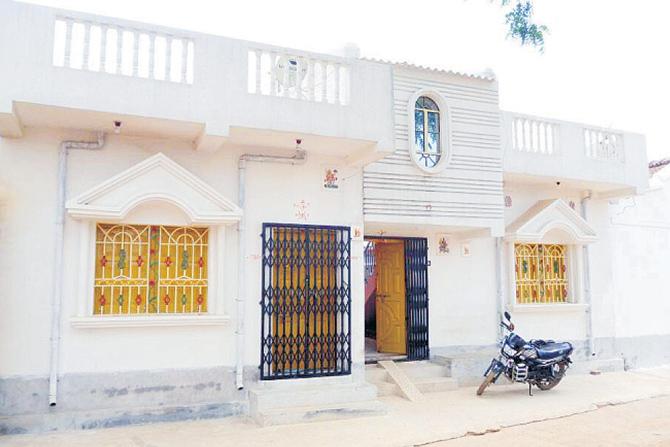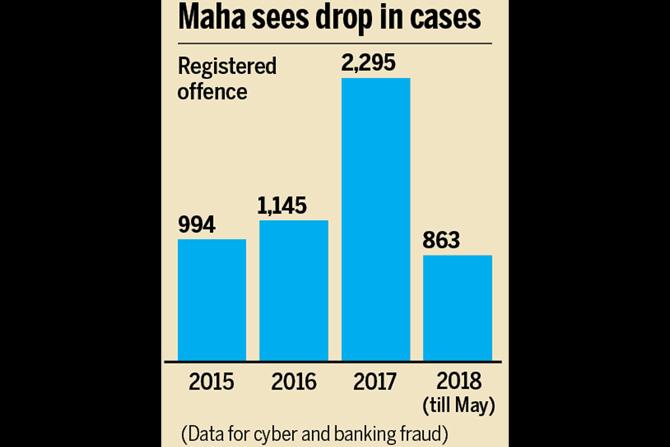The sharp decline in cyber and banking crimes since 2017 in Maharashtra was the result of efficient planning by the Jharkhand cops to weed out criminals from its fraud capital Jamtara

The villagers of Jamtara usually worked in pairs. Dialing any number at random, they first tried and convinced the victim of their presumed identity, mostly that of a bank staff. Illustration/ Ravi Jadhav
The country's fraud capital Jamtara, a district in Jharkhand, which rose to notoriety in 2017 for vishing, appears to be having it rough with local law forces. Vishing is a crime where a phone is used to attempt to scam users into surrendering private information.
Statistics from the state's cyber crime cell have revealed that Maharashtra, which stood third in the list of cyber vishing crimes - after Madhya Pradesh and Andhra Pradesh - with 2,443 registered cyber fraud cases in 2017, has seen a drastic drop this year. Until May 2018, the state only registered 900 cases. "We are yet to compile the data of the remaining months, but there has been a remarkable decrease in the number of cases registered in cards, banking and investment sectors," said Dr Balsingh Rajput, superintendent of police, cyber cell. He said "heavy crackdown on the scamsters" by the Jharkhand Police has not only led to a sharp decline in the crime in Mumbai, but across the country.

Pradip Mandal and Pradhuman Mandal, from Karmatar village, who were arrested by the Jamtara police in June last year
How Mumbaikars suffered
Jamtara drew the attention of local authorities after cops from across the country started visiting the district every 15 days to trace and arrest fraudsters, involved in vishing. The district comprises 1,175 villages, and investigations revealed that more than 50 people were involved in the scam. The Mumbai Police too upped its ante after several Mumbaikars became victims of the fraud.
In June last year, a 38-year-old businessman from Marine Drive received a phone call from a fraudster, who claimed to be an executive with a bank with which he had a credit card. The executive - on the pretext of increasing the credit limit of the card - obtained card details of the businessman, including his OTP, CVV number, birth date, the 16-digit card number and expiry date. By the time, the businessman realised what was happening, Rs 3.56 lakh had been withdrawn from his account, In the same month, Arpit (name changed), who worked with an MNC in Kamala Mills, received a call saying his ATM card had been blocked as someone was trying to clone it, and that they would need his bank details, in order to report the matter. "I shared my card details, and lost Rs 1.34 lakh," said Arpit, who registered a complaint with the Worli Police.

A home built by an accused in Jamtara with money made from vishing crimes
A simple formula is used to carry out a vishing crime, said an officer with the cyber cell at a South Mumbai police station. "One person sitting with a smartphone in his hand dials a random mobile number. Now, with the help of some apps, they can get the picture of the number holder, too. They call you up, speak with complete authority and conviction, and confuse you so that you don't realise you are sharing vital information related to your bank account," said the officer.
Crackdown begins
Jamtara, a district with 1,175 villages, has a population of less than 8 lakh (according to the 2011 census). Most of the people in these villages are engaged in farming. "Police forces across the country were puzzled and couldn't fathom how poorly educated, young lads could siphon off lakhs of rupees from accounts of people living in metro cities," said Brijesh Singh, special IG, cyber and security.
Things changed after the Jharkhand Police started taking note of the changing fortunes of the villagers. Initial investigations revealed that there had been an unusual rise in wealth in the district. "There wasn't only an increase in the money being deposited in youngsters' account, but e-wallet transactions were also increasing. The district also saw a boom in the number of showrooms selling high-end cars and mobile phones. Two storey homes had also become a common sight," said an officer, on condition of anonymity.

Navin Kumar Singh, IG (Ranchi), Jharkhand was appointed for the task. "When we started receiving an increasing number of requests from police forces across the country, we realised that vishing was rampant here. The situation went out of hand. We had to take action," said Navin.
Foolproof strategy
In order to tackle the crime, the police came up with an eight-point strategy. The most important component of the plan, said Navin "was to generate enough actionable intelligence" to act against the criminals operating out of Jharkhand. As part of the plan, 'call to action' advertisements were issued in print and electronic media to share information about cyber criminals, using the existing 'Dial 100' and online reporting platform of the Jharkhand Police. Immediately, several law-abiding citizens, mostly victims, started reaching out to the police. "The idea here was to get as much information about these cyber criminals and their modus operandi," said a police officer of the Jharkhand Police.
Next, the police worked on developing a seamless inter-state coordination mechanism between nodal officers in all the affected districts and the cops in Jharkhand. "We developed an 'online investigation cooperation request platform', where any investigating officer from the country could register his/her request for cooperation regarding cyber crimes having links in Jharkhand," the officer added.
Based on the requests, registered cases and available inputs, the police were able to prepare 'heat maps' and zero in on the worst-affected areas exploited by the fraudsters.
This was followed by improving the capacity in the six notified cyber-crime police stations, Deoghar, Dhanbad, Jamtara, Gridih, Bokaro and Dumka. Approximately 300 new technical staff were recruited in the police department and sent to various cyber cells and police stations across the district to tackle cyber-related crime, the officer said.
The Jharkhand Police also started work on bringing all the stakeholders together, "with periodic structured meetings with the service providers, and people from the telecom, internet and financial industries". Meetings were also held with nodal officers of all states.
For solving attribution related problems, cops focused on enforcement of Know Your Customer (KYC) norms. "The phone SIM cards used in the crimes were taken on incomplete and fake documents. We needed to sensitise all service providers, distributors and retailers, especially in the affected areas, to ensure that the right documents were being provided," said the officer.
The police also improvised evidence collection. "We intercepted the numbers and captured the voices of criminals, which were subsequently matched with the arrested accused. In fact, it has helped us register more cases, as we have strong evidence," the official said. Finally, the police initiated awareness programmes for parents of juveniles in affected areas.
"This eight-point strategy has not only helped reduce the frequency of cyber crimes in Jamtara, but also across Jharkhand," said Navin Kumar. Between October 2017 and August this year, the police recovered approximately Rs 2.17 crore from fraudsters operating out of the districts of Jamtara, Deoghar, Dumka, Giridih and Dhanbad in Jharkhand. During this period, 172 fresh cases were registered, 525 criminals arrested and 1,845 SIMs used by fraudsters recovered.
"We have already got convictions in 10 cases that included 18 cyber criminals, and many more are in the pipeline," said Navin Kumar. "Our model can easily be applied by other state police forces too."
Also Read: 7 Arrested For Cyber Theft In Delhi
Catch up on all the latest Mumbai news, crime news, current affairs, and also a complete guide on Mumbai from food to things to do and events across the city here. Also download the new mid-day Android and iOS apps to get latest updates
 Subscribe today by clicking the link and stay updated with the latest news!" Click here!
Subscribe today by clicking the link and stay updated with the latest news!" Click here!









